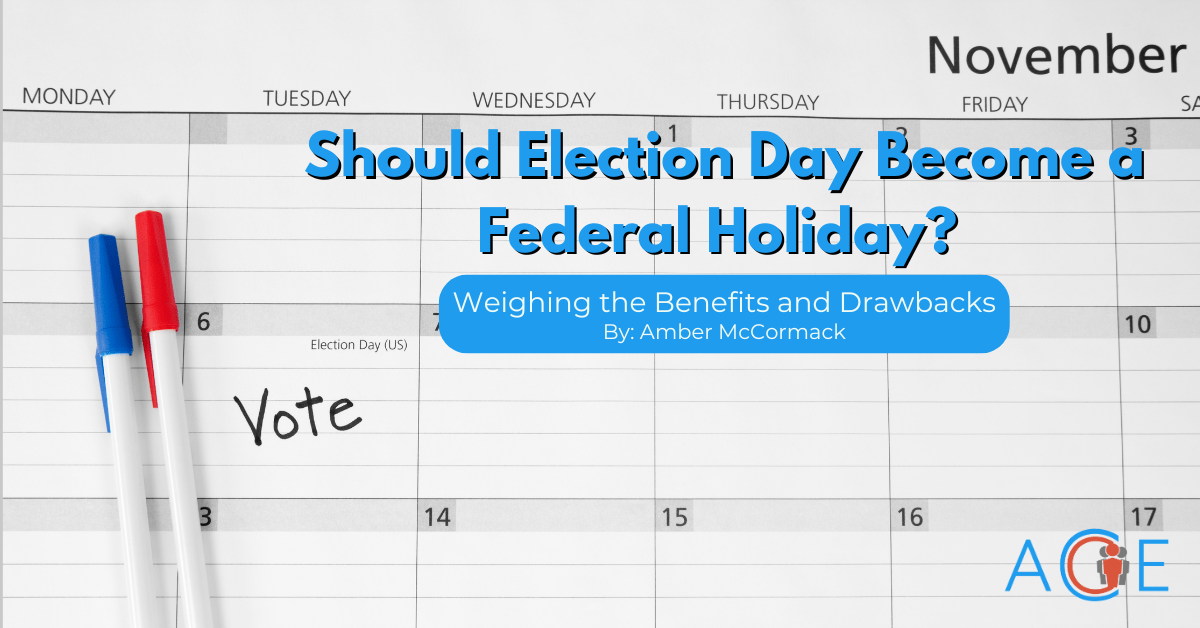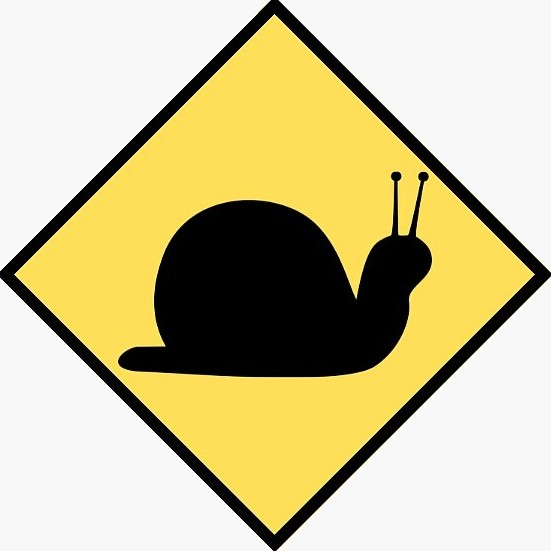Is it time to make Election Day a federal holiday? 🗳️ Some say it would boost voter turnout and align the U.S. with other democracies, while others argue it could create challenges for hourly workers and cost millions. Dive into the debate over whether a federal voting holiday is the best way to strengthen democracy or if there are better solutions. Check out the full breakdown!
Yes.
In France, voting day is always a Sunday. And if you work on a Sunday (most people don’t), your boss has to schedule your working day so that you can go and vote.
Yeah, because in France they’re a hair trigger away from setting shit on fire, like all the time.
If that’s what it takes, I guess
Cons: wealthy people will lose money…
Here in Canada All employees who are Canadian citizens and 18 years of age or older are entitled to have three consecutive hours off on Election Day to vote. Voting hours in the Eastern time zone are from 9:30 a.m. to 9:30 p.m. If an employee’s hours of work do not allow for three consecutive hours off within this period, the employer must give them sufficient time off to meet the requirement of three consecutive hours.
So many things to fix about our broken democratic institutions. Every state should have mail-in voting as well as early voting. Every state should automate the registration of voters as much as possible as well. And sure, election day should be a federal holiday, or moved to Sunday or Saturday, at least.
Other things to work on: ranked choice voting and getting rid of the nasty racist holdover that is the EC. Also, we need to remove the special privileges that rural land has over people. Way too many ways our current system gives remote areas more representation than they should have…
Good points except for Ranked Choice. That archaic voting system is a sort of poison pill.
It doesn’t actually solve any of the problems proponents claim it does, and it adds complexity and additional points of failure. It was designed in 1788, but rejected for use in France at the time due to the habit of eliminating the Condorcet winner. (The person who would win in a one on one election vs all other candidates)
The bad idea was then reinvented in the early 1800s as the Single Transferrable Vote, with no fixes for that pesky Condorcet issue.
No, the way to go is either the simplicity of Approval, or the more granular STAR. (STAR is the new hotness, designed this century, with the pitfalls of past systems in mind)
Both systems are completely immune to the Spoiler effect while also allowing, or even encouraging the growth of third parties.
My impression is that when most people mention “ranked choice” voting, what they really mean is “ranked choice voting with instant runoff” which is functionally identical to STAR voting.
The two are not functionally identical at all.
Ranked Choice is a broken Ordinal voting system.
All Ordinal voting systems are flawed, because when you have to rank A over B, you will eventually reach a point where C can become a spoiler candidate.
Cardinal voting systems are immune from this, because you rate the candidates independent of each other. It doesn’t matter how many candidates are on the ballot, because you’re rating them vs your support, not their rank vs each other.
Cardinal systems allow you to rate two candidates the same, either with full support or full disdain.
Do you have a link that explains what you’re talking about? I’m having a hard time reconciling my understanding of Ranked Choice (with instant runoff) with the downfalls you describe.
Edit: I came across this: https://betterchoices.vote/Cardinal It explains the spoiler problem with Ordinal voting systems, but also illustrates problems with Cardinal voting systems. Interesting stuff.
I’m so glad I found this site! I think I’ve been converted to a Consensus Voting proponent instead of Instant Runoff.
You can read more about it here: https://betterchoices.vote/ConsensusVoting
Ahh, the bullshit “bullet voting” nonsense.
That’s a sort of made up problem with cardinal systems that ignores one tiny little issue. Approval, is a Cardinal voting method that is 100% bullet voting, because there’s no scale. Just a simple yes and no per candidate.
It gives better results than every single Ordinal system.
These geeks study election systems in far too much detail. And have a handy little chart of Baysian Regret Basically they did math and computer shit to figure out how “happy” people would be with the results of a set number of simulated elections with roughly identical factors except the voting system used and how honestly vs strategic you are in your voting,
Approval, which is 100% bullet voting, and still comes out better for overall satisfaction of results than its closest Ordinal competitor.
Consensus is just Condorcet voting. Technically, Approval is Condorcet compliant. It might actually be the only true way to find the Condorcet winner.
Anyway, there’s more, and I should link more.
How do you counter the arguments about strategic votes in Cardinal voting systems? Those arguments are explained here: https://betterchoices.vote/Cardinal
Put simply, Approval is still subject to strategic voting that undermines the purpose of the system. In practice, nobody is going to approve of a centrist candidate from the other party because that approval vote might be the only reason that their party loses.
Specifically, which problem do you think that ranked choice proponents are incorrect about?
Ranked choice voting does one thing, allows people to vote for the candidates they actually want and that’s it. All kinds of people try to shoehorn in other ideas, but at the end of the day the one and only problem its intensed to solve is people having to vote for candidates they don’t like.
See, it’s that one thing you mentioned.
The voting for the candidates people actually want.
That’s what it doesn’t actually do.
What Ranked Choice actually does is remove non-viable third parties from the election. That’s it. You can throw a sympathy vote over to the third party of your choice, but the next line on the ballot will be the major party candidate, because you certainly don’t want the other side to win. Say you throw a vote for the Greens, but your next choice is going to be the main ticket Dem, or else you risk the Republicans winning.
The problem comes when that third party just reaches viability. See, if the Greens are eliminated first, all the votes on the ticket then go to the Dem, but if somehow the Greens slip past the Dems, then the Dems are eliminated first, and the Dem first voters likely didn’t list the Greens as their next choice.
And here’s the thing. Republicans know that if the Greens knock out the Dems, then Republicans win. So a chunk of the Republican base strategically vote for the Greens as their first choice, and Republican as their second. And by lowering the support for their own candidate, they’ve secured the election for that candidate. This is the only voting system in existence that lets you show less support to a candidate to help that candidate win.
Tell me that shit isn’t broken, and I’ll call you a liar.
And that’s just one of a dozen show stopping faults in that voting system.
The next is ballot exhaustion.
If you rate A then B then C, but they get knocked off the ballot B then C and then A, your votes for B and C are thrown out completely. So if literally every single vote listed B as their second choice, B would be eliminated even if they were universally acceptable to the voting public. But it doesn’t matter, they were eliminated in an earlier round so universal support just isn’t looked at.
And finally, what’s the little issue of the rankings themselves. All we know is that you prefer A to B, and B to C. But how much do you actually prefer A to B by. and is that the same amount that you prefer B to C by.
Do you rate A and B as mostly the same but then rate C as a sort of horrible monster who you only begrudgingly support? We don’t know because that info isn’t collected on the ballot. STAR fixes that one, each candidate can have the same score in STAR, and with the scale going 0-5 you can get somewhat granular with your preferences.
If a majority of people vote Republican and they win, that’s a good thing. It seems like you don’t really understand ranked choice voting. It’s not perfect but it’s absolutely better than our current system.
I do understand Ranked Choice, and understand that it’s actually worse than our current system except for one small area. And that’s the elimination of non-viable spoiler parties.
Ranked Choice eliminates them from consideration.
As to its real world application, Ranked Choice is constantly fucking up elections.
https://electowiki.org/wiki/2009_Burlington_mayoral_election
If you’ll notice in that breakdown, the number of exhausted ballots was twice the margin of victory.
All this stems from the fact that RCV is really just First Past the Post, but done a bunch of times on a single ballot.
You cannot solve the problems of plurality by iterating plurality.
It’s a bad system that is, in many ways, worse than the one we already have.
Let’s just swap from Thanksgiving (a holiday about racism and genocide) to Election Day. So there’s no net cost. Just swapping from one day to another.
I was thinking either Memorial Day or Veteran’s Day, since they seemed kinda redundant. Alternatively, President’s Day being moved to the election day seems like it would make sense.
Thanksgiving is practically a religious holiday at this point. Can’t deprive Americans of their celebration of gluttony and genocide. There’s a parade and everything.
Shithole country. Honestly, together with the issues like voter roll purging and winner takes it all. How can you take this “pro/con” discussion even seriously?
The real question should be why the US is so undemocratic, what the forces are that drive this minority rule and prevent a more free and open society.
All of those drawbacks are bullshit.
Early voting and mail in ballots should be more available to everyone. That’s not a reason not to make it a holiday.
Private employers can’t be forced to observe a holiday. That’s not a reason not to make it a holiday. People required to work could still go before or after work, and would see reduced wait times because public employees would be able to go during work hours.
Finding childcare for the day is a problem anyway, as polling places are often schools, and the kids are sent home anyway. If it was a holiday, you could take your kids with you to the polls and then go to the park. That’s almost a reason not to make it a holiday, but not really.
If banks, post offices, and schools are all closed, a lot of businesses will also close because work slows down. Other employers, like retailers, food service, and entertainment venues like movie theaters would all see an uptick in business, and would probably offer extra pay for those shifts.
Yes to mail in ballots. Yes to early voting. Yes to a national election holiday. Reduce the barriers to voting. No to ID laws. No to voter roll purges. No to proof of citizenship requirements.
Over here all employers have to give employees 4h to vote. So if it’s open from 8 to 8 and you work from 8 to 4 they don’t have to give you time off, but if you work 8 to 6 they have to cut your shift at 4 instead.
That’s a good system. Let’s do that.
ID and citizenship requirements seem like pretty basic requisites to voting, what’s wrong with those?
Because not everyone has an ID or proof that they are a citizen, and in the United States, you’re presumed innocent until proven guilty. When you register to vote, you fill out a form stating you are a citizen and elligible to vote. There are existing mechanisms to check that voters are eligible. If you lie or commit fraud, those are crimes. There’s a paper trail, and if it were an actual problem, there would be proof that it’s happening.
Homeless people have the right to vote. Forgetful and disorganized people have the right to vote. Hermits and people who survive house fires have the right to vote. ID requirements or requiring proof of citizenship creates an unnecessary barrier that disenfranchises more legal voter than the illegal votes it prevents. Because that’s the point of them, they want to stop legal voters from voting.
But you can’t ignore very real problems with increasing the pool of ignorant voters, since whoever has the most access to that pool will have an advantage because these ignorant voters can be taken advantage of simply because they are ignorant. Should people be voting if they don’t know how the system works or what the candidates even stand for? If you can’t be bothered to care about it enough to go through minimal requirements, do we need to go out of our way to shove a ballot in their hands?
And yes, I acknowledge that the kind of thinking I outlined above can be used to repress voters as well. I guess my point is that these policies cut both ways. It’s not such a clear cut answer as “give everyone a ballot”, because that can (and has) very very easily turn into “give them a ballot and suggest who they should vote for”.
Inconsistent access and inconsistent standards, for the most part.
A classic example is how certain states (Texas, for instance) will assert that gun licenses qualify as a valid ID but state university student IDs will not. Another is in how IDs - like driver’s licenses - have a fee associated with registration and renewal, which amounts to a poll tax. A third is that citizenship isn’t necessarily a prerequisite for voting in municipal and state elections. So requiring someone to be a citizen before accessing a ballot becomes an unconstitutional burden at the state and local level.
Then there’s the fact that we already have a voter id system. It’s called your voter registration card. You typically get one after you’ve registered to vote in your municipality. The fight over voter ID is that you need a second piece of identification on top of the registration card.
Broadly speaking, if everyone was afforded equal access to a single uniform ID document at no cost, there wouldn’t be a problem. But so much of the Voter ID rules don’t establish homogeneous ID requirements. Implementation is left up to the states. So states with a history of hostility towards democratic rule can back-door disenfranchisement into the process of obtaining these documents.
I live overseas so I’m eligible for an absentee ballot.
I filled it out and submitted it a few weeks ago.
It was all done through the government website for my state and email.
Couldn’t be easier.
Everyone should be eligible for mail in or early voting.
Presidential elections occur on leap years where we just plain add an additional day to the year on our calendar. This isn’t as complex an issue as the article wants it to seem.
Even easier. Make the shit electronic. Stop pussy footin around and make it available on the Internet.
As a programmer I really really don’t think this is an idea we’re capable of implementing in a way that’s safe/secure/etc.
See also: https://xkcd.com/2030/
You aren’t the only programmer in the world
Yes, but I believe e-voting being a bad idea is the common opinion among not just programmers but cybersecurity professionals specifically as well.
I mean, you’re wrong lol
So laughably wrong. It’s a great idea because it puts the power in the people. It is the only equalizer left. The possibility of the outcome greatly outweighs the challenges to make it work.
There are plenty of cyber sensitive occupations that rely on the Internet and work. The fact that this one thing is “not possible” is like giving up without any effort whatsoever.
The problem isn’t that it can’t be done, the problem is that it can’t be done without disruption.
If eVoting were a thing, how long do you think it would take for 4chan to completely fuck it up?
And I don’t mean in a “In a stunning upset today, the new President is write in candidate Boaty McBoatface”, I mean in a DDoS attack blocking ANYONE from voting.
Heck, even systems that expect mass traffic without interruption go down all the time like when a new game gets released, you think voting traffic is somehow immune to that?
Voting is too important to leave to an electronic system.
It’s already done electronically. The information is just shifted to a different medium. Saying that it can’t be done when it’s already being done isn’t factual.
The tabulation is done electronically, on machines with no internet connection.
Voting electronically involves opening a machine to the public internet and that way lies madness.
I’m not wrong lmao. I didn’t say it was impossible, I said the government is not capable of implementing it in a way that would be secure. Put up or shut up, don’t just claim that I’m wrong because you said so lol
The importance of the service is also exactly why it would be one of the most attacked online systems in the entire world. Even relatively secure systems are hit with zero-day attacks that can entirely compromise them. The US government especially is technologically outdated and I wouldn’t trust them to so much as install security updates.
I mean I know you think aren’t. But you are. It’s cool. You know programming to an extent. But there is PLENTY of evidence to show that you are. There are many other applications in use today that show it’s feasible. It’s like arguing the sky isn’t blue because you have your sunglasses on. Sure. It’s in your wheelhouse. Doesn’t mean it shouldn’t be done. It should be. It would equalize everything.
You know programming to an extent
That’s just rude lol, you know nothing about my experience. My personal opinion isn’t even super relevant here though; if we look at the professional consensus, they tend to agree.
I haven’t seen any evidence that you have any understanding of this topic at all. You keep saying we should do it because it would be good-- which it would be-- but wanting something to be easy doesn’t actually make it easy. You say there’s plenty of evidence; SHOW IT then if you’re so confident! I’ll even start, here’s an article by the AAAS with sources: https://www.aaas.org/epi-center/internet-online-voting
I know enough about the internet to know that this would end up being a bad idea. Not to say that there isn’t a way to correctly implement it (I honestly don’t know). But even if there is, should we trust them to do it correctly? Our (US) government full of octogenarians?
Why? Everything is on the Internet. You can buy houses and bank on the Internet. There are scams sure. But the physical votes are still tabulated and entered into the fuckin Internet!
Right. And you trust the American government to be transparent with this process? You trust every individual involved in programming this system not to fuck it up in some way, intentionally or not?
There’s just way too much that can go wrong, and more possible attack vectors that could possibly be accounted for. We already have state actors actively attempting (often successfully) to interfere with our elections. What makes you think putting it online wouldn’t make that 1000x worse?
Not to mention you can’t even go back and see what the people really voted. If someone sneaks a
if (vote == KamalaHarris.vote) { DateTime currentTime = DateTime.Now; If (currentTime.Seconds % 3 = 0) DonaldTrump.voteCount += 3; else KamalaHarris.voteCount += 1; }into closed source code, you’ve got fuckery that will take a computer scientist to find, and no way to unfuck the election.
I prefer my paper ballot, thank you, though I’ll allow it to be scanned by a computer, as long as the computer is checked for fuckery like the above first.
The voting machines that those votes are originally entered into are not connected to the Internet, they’re on their own disconnected network, and for very good reason. Software is far from perfect, and putting voting software on the Internet would immediately make it a target from attackers all over the world, and they would absolutely be hacked and manipulated.
I worked in an election. The tabulations are very much uploaded into a main frame.
For record keeping purposes, sure, not as a means to conduct the actual election. In a lot of places, paper ballots are still manually counted. Most places have a Scantron-type device that scans your filled-in ballot, but those machines are not Internet-connected. If they are networked, they’re on their own separate air-gapped network.
Not where I was working. 90 percent were electronically entered. And I didn’t even work in the most affluent county in my state. Electronic voting is very prevalent.
The electronic machines used to cast* votes are not connected to the Internet.
One more absolutely not.
Let’s follow two votes. Vote #1 was cast in Colorado.
- It starts as a paper ballot sent by standard (“snail”) mail from our election division to me, the voter. I am notified it’s coming.
- I mark this ballot like I would an exam, just with a blue or black pen and not a #2 pencil. I’m going to do this in front of my computer, with ballotopedia open and key issues already marked.
- I drop this ballot off at the Election Division drop box. I am notified they received it.
- If there are problems, I am notified that I need to come in and ‘cure’ them.
- Once it’s accepted, I am notified, and then it’s scanned in to a tabulator. Once it’s scanned, it’s stored in a secure box.
- On Election Day, it’s counted, and the results are posted.
- If the election is close, or there is real evidence of criminality, the ballot is retrieved from its secure box and electronically or hand-counted again.
Vote 2 was cast in Louisiana.
- The voter must go to a designated voting centre on a voting day.
- The ballot is voted on an electronic machine that does not generate a paper trail.
- The vote counts are stored within the voting machine.
- If the election is stolen, there is no way to go back and check. The machines say what the machines say, and it’s trivial to engage voting shenanigans without any paper trail to track it down.
I’m going to fight hard for my system, buddy. You can keep your internet voting.
as a retail worker, i don’t ever get any other holidays off, why would my employer (or the insame amount of entitled shoppers) respect some new holiday?
They probably won’t, but don’t let the perfect be the enemy of the good. This improves the situation. Just because it doesn’t help everyone isn’t a good enough reason not to do it at all.
If only we had some type of… I don’t know what the word for it would be… Well, some sort of system that the people in a society agree to be governed by that could force these businesses to respect this holiday…
Oh well.
Do you get any extra pay for working on a holiday?
Hah!
Good one!
Having worked retail in my younger days it’s maybe the worst role I’ve ever had (tied with the sales aspect of a job I had later on in my career).
Shit pay, shit hours, ever changing schedules, horrible management, toxic work environment, frequent abuses of employees (shit like working long hours with no breaks, surprise shift extensions because someone else called off, etc.), ridiculously petty rules and policies, etc.
The idea of any sort of pay for anything other than working the equivalent hours (or more…retail is notorious for trying to get free labor off the clock) is a fairy tale.
Would rather just have voting being more than 1 day. Make it a week plus mail in voting.
Have enough states screwing around with voting locations to limit it to just a day
I was surprised to learn that there are still states where you can only vote one day. California and Texas have allowed early voting for over 40 years and it’s so easy to vote. Texas even passed a law requiring polls to be open at least 9 hours the first week of voting and at least 12 hours the second week and final day of voting. I’ve only waited in line twice and the longest I’ve waited was 10 minutes.
Yeah I don’t get lines in Ohio either. Maybe 2-3 mins if I go at a busy time.
When you see the reports/photos/videos of lines, take note of the location of the polling place and what the class and racial makeup of the jurisdiction is. Maybe even take note of the racial makeup of the people in the lines.
Then look at how many polling places per capita they have compared to other areas in the state.
Trying to not have to spell it out…
Of course it should be.
OK, so make all voting days a holiday?
this is the pinnacle of stupid writing. Calling this “Research” is nonsense. You should have the day off if you have an “I voted” sticker. Not only should election day be a day off but so should:
- Primaries
- Special Elections
- Voter Registration deadlines.











